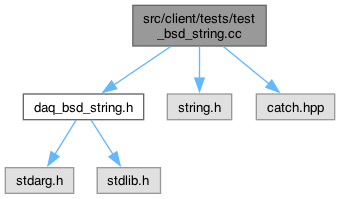Include dependency graph for test_bsd_string.cc:

Functions | |
| TEST_CASE ("daq_strlcpy copies strings safely when buffers are sufficiently large") | |
| TEST_CASE ("daq_strlcpy copies strings and truncates when the dst is too small") | |
| TEST_CASE ("daq_strlcpy does nothing when arguments are bad") | |
| TEST_CASE ("daq_strlcat appends strings safely when buffers are sufficiently large") | |
| TEST_CASE ("daq_strlcat appends strings safely and truncates when needed") | |
| TEST_CASE ("If given a non-null terminated dest, strlcat will truncate the " "destination and not overflow dest.") | |
| TEST_CASE ("daq_strlcat does nothing when arguments are bad") | |
| TEST_CASE ("An empty or NULL string has zero bytes remaining") | |
| TEST_CASE ("A string that is full will have zero bytes remaining") | |
| TEST_CASE ("A string that is not null terminated will have zero bytes remaining") | |
| TEST_CASE ("A string who's buffer is not full will give the proper length back") | |
| TEST_CASE ("You can slprintf into a string whos buffer is big enough") | |
| TEST_CASE ("You can slprintf into a string whos buffer is big enough to concatenate") | |
| TEST_CASE ("You can slprintf into a non-null terminated string and it will " "truncate the buffer") | |
| TEST_CASE ("You can call slprintf with bad arguments") | |
Function Documentation
◆ TEST_CASE() [1/15]
| TEST_CASE | ( | "A string that is full will have zero bytes remaining" | ) |
◆ TEST_CASE() [2/15]
| TEST_CASE | ( | "A string that is not null terminated will have zero bytes remaining" | ) |
◆ TEST_CASE() [3/15]
| TEST_CASE | ( | "A string who's buffer is not full will give the proper length back" | ) |
◆ TEST_CASE() [4/15]
| TEST_CASE | ( | "An empty or NULL string has zero bytes remaining" | ) |
◆ TEST_CASE() [5/15]
| TEST_CASE | ( | "daq_strlcat appends strings safely and truncates when needed" | ) |
◆ TEST_CASE() [6/15]
| TEST_CASE | ( | "daq_strlcat appends strings safely when buffers are sufficiently large" | ) |
◆ TEST_CASE() [7/15]
| TEST_CASE | ( | "daq_strlcat does nothing when arguments are bad" | ) |
◆ TEST_CASE() [8/15]
| TEST_CASE | ( | "daq_strlcpy copies strings and truncates when the dst is too small" | ) |
◆ TEST_CASE() [9/15]
| TEST_CASE | ( | "daq_strlcpy copies strings safely when buffers are sufficiently large" | ) |
◆ TEST_CASE() [10/15]
| TEST_CASE | ( | "daq_strlcpy does nothing when arguments are bad" | ) |
◆ TEST_CASE() [11/15]
| TEST_CASE | ( | "If given a non-null terminated | dest, |
| strlcat will truncate the " "destination and not overflow dest." | |||
| ) |
◆ TEST_CASE() [12/15]
| TEST_CASE | ( | "You can call slprintf with bad arguments" | ) |
◆ TEST_CASE() [13/15]
| TEST_CASE | ( | "You can slprintf into a non-null terminated string and it will " "truncate the buffer" | ) |
◆ TEST_CASE() [14/15]
| TEST_CASE | ( | "You can slprintf into a string whos buffer is big enough to concatenate" | ) |
◆ TEST_CASE() [15/15]
| TEST_CASE | ( | "You can slprintf into a string whos buffer is big enough" | ) |